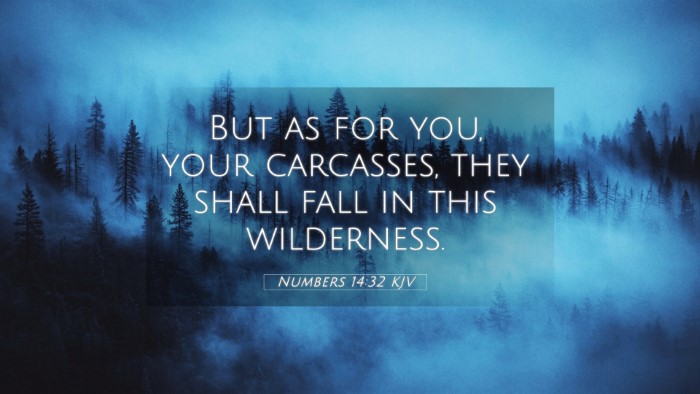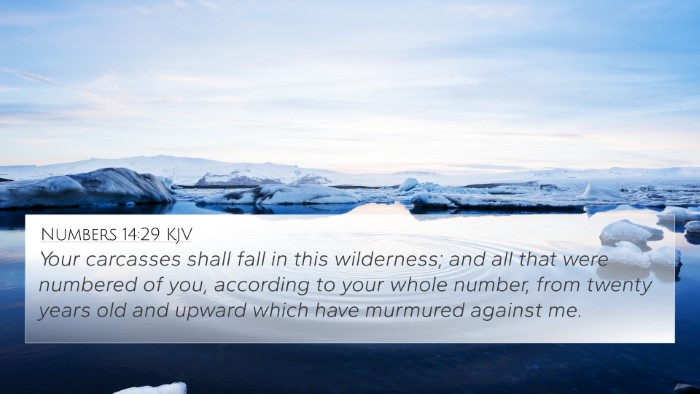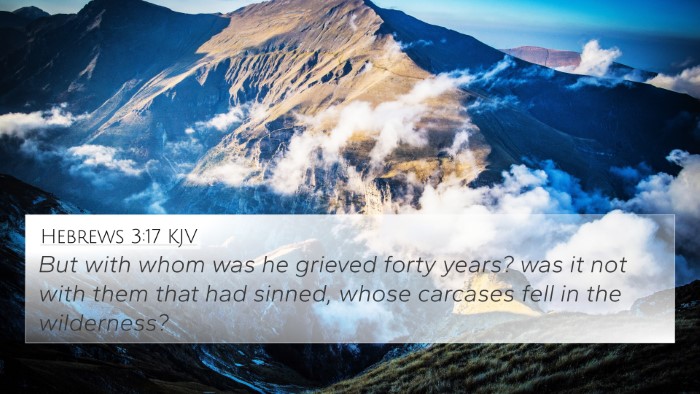Understanding Numbers 14:32
Numbers 14:32 states: "But as for you, your bodies shall fall in this wilderness." This verse highlights a significant moment in the narrative of the Israelite journey in the wilderness, serving as a solemn reminder of the consequences of disbelief and rebellion against God's commandments.
Commentary Insights
The verse serves to emphasize several key themes found throughout the Bible, particularly those discussed by public domain commentaries. Insights from Matthew Henry, Albert Barnes, and Adam Clarke help elucidate the meaning behind this passage:
-
Matthew Henry:
Henry reflects on the consequences faced by the Israelites due to their lack of faith. This verse encapsulates the judgment they brought upon themselves for refusing to enter the Promised Land, which symbolizes God's blessings. He points out that their disbelief led to physical death in the wilderness instead of spiritual victory.
-
Albert Barnes:
Barnes notes the gravity of this divine punishment, suggesting it not only serves as an indictment of their lack of faith but also foreshadows significant spiritual lessons for future generations about the importance of obedience. He further draws links between their refusal to trust God and the broader narrative of redemption in the Bible.
-
Adam Clarke:
Clarke emphasizes that this verse underscores God's sovereignty in judgment while also revealing His mercy. Despite the harsh consequences, God allowed a remnant to survive and ultimately enter the Promised Land, illustrating a theme of hope intertwined with judgment.
Thematic Connections
This verse has several thematic connections to other Bible passages, illustrating the interwoven nature of scripture:
- Hebrews 3:17-19: This passage references the disobedience of the Israelites, highlighting the theme of faith versus unbelief.
- 1 Corinthians 10:5: Paul uses the example of Israel in the wilderness as a warning for the New Testament church about the consequences of rebellion against God.
- Deuteronomy 1:35-36: God reiterates His judgment upon the Israelites, demonstrating the seriousness of their actions in refusing to enter the land.
- Psalm 95:10-11: A reminder of God’s anger against a generation that did not follow Him, which echoes the sentiment found in Numbers 14:32.
- Romans 15:4: This verse emphasizes the importance of Scriptural examples for our learning; Numbers 14 serves as a significant example of the cost of rebellion.
- 2 Peter 2:5-9: These verses illustrate God's judgment in history as a warning for present-day believers, linking back to the judgment faced by the Israelites.
- John 6:49: Jesus refers to the ancestors who ate manna in the wilderness, contrasting their physical sustenance with the spiritual sustenance He offers.
Cross-Referencing the Bible
Cross-referencing provides deeper understanding and connections between scriptures, allowing for a more comprehensive study of biblical themes. Here are some tools and methods for effective cross-referencing:
- Using a Bible concordance to identify keywords and find related verses.
- Employing a cross-reference Bible study guide that lists connections between different passages.
- Utilizing a comprehensive Bible cross-reference system to systematically analyze thematic links.
- Engaging in cross-referencing Bible study methods that explore the intertextuality of scripture.
- Accessing Bible reference resources that compile related verses for enhanced study.
- Practicing Bible chain references to trace themes through various books of the Bible.
Conclusion
Numbers 14:32 serves as a potent reminder of the realities of faith, obedience, and the consequences of rebellion against God's will. By examining this verse in the light of public domain commentaries and exploring its connections to other scriptures, believers can gain greater insight into the importance of trust and obedience in their walk with God. The thematic links and cross-references contribute to a richer understanding of the scriptural narrative and the character of God.





